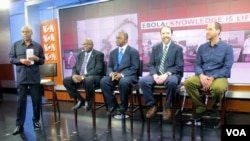Time is of the essence in identifying and treating those infected with the Ebola virus.
That’s the message of a Voice of America “town hall” on the lethal disease, which has infected some 14,500 people in Liberia, Sierra Leone and Guinea since the current outbreak was identified in March. More than 5,400 of them have died.
The gathering served as a special edition of the weekly Voice of America program "Straight Talk Africa," with several experts discussing the urgency of identifying and treating Ebola.
Dr. Malonga Miatudila helped identify the disease in 1976. Since then, 25 outbreaks have occurred, excluding the current one, and none lasted more than three months. Swift action contained those outbreaks. By the end of 2013, fewer than 2,000 deaths were linked to Ebola.
This time around, Miatudila said, there was a significant time lapse before the public health community and global partners responded to the crisis.
"When it started in Guinea, we waited. We waited, we waited, we waited. We spent time," he said. "We waited more than 100 days before acknowledging we had a problem."
The experts said once the problem was acknowledged, the international community took action and the response to the health crisis improved. They said it’s good now.
Another panelist was Dr. Rick Sacra, the third U.S. citizen to contract Ebola while working in Africa. When he experienced the first symptoms, Sacra was immediately tested and airlifted to the United States for treatment. With modern medical care at a hospital in Nebraska, Sacra survived.
"I received care at a level that is unfortunately not available in Liberia where I was serving," he said. "Our prayer and our effort ... is to bring better care wherever we can, whatever is provided in order to do that."
In countries where Ebola continues to spread, the speakers said one of the biggest challenges is persuading family members and friends of those who have died to abandon traditional funeral and burial practices, which bring them in close contact with their loved ones' bodies – and the virus.
The VOA program’s listeners and viewers were reminded how Ebola is spread: through contact with the contaminated body fluids of people who die. They also were advised to let public health workers handle the bodies of those who have died, and to seek medical care at the first signs of illness.




